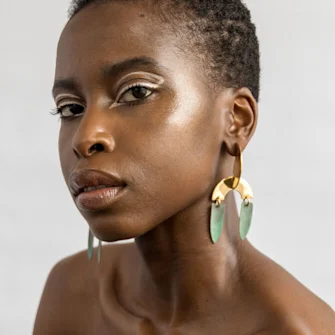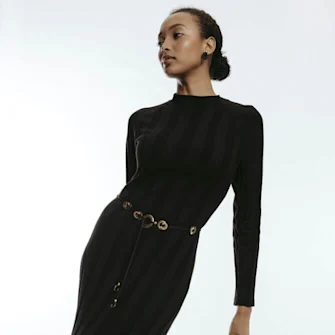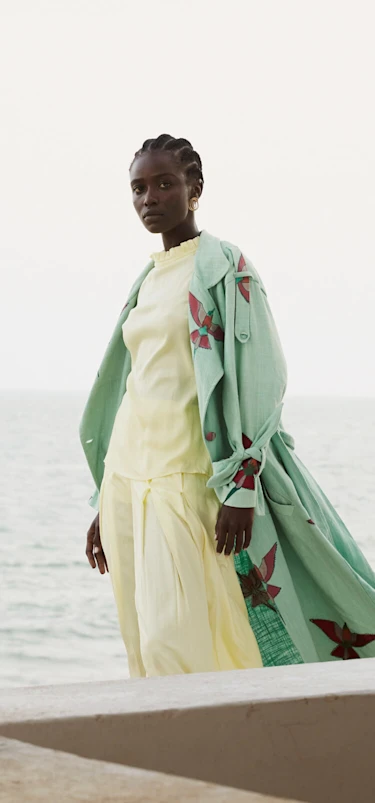IA
Fashion
March 29, 2023
We Dream of Africa
How e-commerce startup Industrie Africa broke into the world’s most competitive market.
Words by Mary Holland
Photos courtesy Industrie Africa
When Nisha Kanabar launched Industrie Africa’s e-commerce site dedicated to fashion in Africa in 2020, the moment couldn’t have been more ripe. Designers across the continent were finally getting the recognition they long deserved, and demand for their products was starting to boom. “African fashion was starting to bubble up in the media, and people started taking an interest,” says Kanabar. “It was very much about timing. We became the go-to stop for the latest in fashion.”
At the same time, many of these designers were snapping up international awards, propelling them onto the global fashion stage. In 2019, Johannesburg-based Thebe Magugu won the LVMH Prize, becoming the first African to do so, and Nigerian designer Kenneth Izedonmwen became a finalist. South African designers Sindiso Khumalo and Lukhanyo Mdingi followed in the years after, gaining LVMH recognition in 2020 and 2021.
Prior to that, designers in Africa were hardly spotlighted, and names like Izedonmwen and Magugu weren’t known beyond its borders. Even Tanzanian-born Kanabar admits that she struggled to find fashion brands in neighboring countries. “Accessing a contemporary picture of regional fashion beyond the dominant lenses of South Africa or Nigeria was quite challenging,” says Kanabar. It’s one of the many reasons she launched Industrie Africa: to offer a window into edgy brands that were flying under the radar. “It was my mission to create a product that advanced African fashion on the global stage while also preserving and celebrating local heritage, identity and the diverse voices of the continent.”
As a fourth-generation Tanzanian who had previously worked at American Vogue and Style.com in the Middle East, Kanabar understood the complexities many African retail brands face. “I was able to see both those sides and realize there was a major gap,” she says. What started off as an experiment and tool for buyers and stakeholders to navigate the world of Africa’s fashion industry quickly became what could be considered Africa’s own Net-a-Porter, stocking some of the continent’s hottest designers, like Lisa Folawiyo in Nigeria and Lezanne Viviers in South Africa. Though it’s not on the same scale (Net-a-Porter stocks some 1,000 brands, while Industrie Africa stocks around 50), it’s arguably as discerning in its curation.
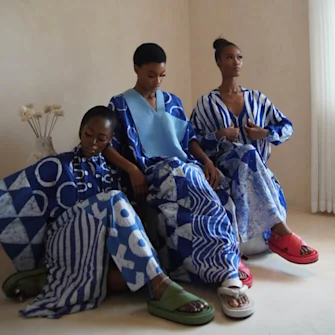
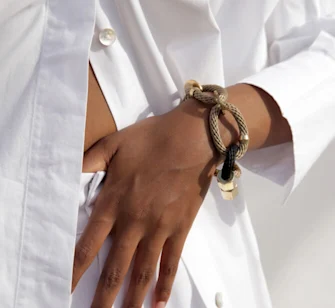
The platform is also competing for the same market share as big international luxury marketplaces, which appear to be gaining momentum. The luxury sector is expected to grow between 5% and 10% in 2023, according to a recent McKinsey report, and online retail is projected to increase at least through 2025, according to Statista. Retail e-commerce is also a trillion-dollar industry, with brands like Saks Fifth Avenue aggressively advancing their online offerings while secondhand retailers like the RealReal crowd the marketplace. For any newcomer, it’s crucial to carve out a unique offering and narrative.
The underlying talent of your designers can make all the difference. Ghana-based Akosua Afriyie-Kumi of AAKS, a brand that produces bright tufted woven bags and baskets with colorful accents, has worked with Industrie Africa since it launched. “I was so excited because I thought it’s something that’s needed in Africa, and we didn’t have anything that served this purpose,” says Afriyie-Kumi, remembering when Kanabar first got in touch. “They’ve done such a great job at pinpointing all these cool brands from Africa and keeping it consistent.” Afriyie-Kumi has collaborated with many retailers, like J.Crew, but Industrie Africa serves a purpose beyond pure sales. “It’s made a great difference in terms of serving African content — for people outside of Africa to have direct access to it.”
But breaking into new markets is no easy feat. “When you’re tapping into a new market without having enough visibility, it’s a risk for someone to ship it to the U.S. without knowing the product in person,” says South African fashion designer Lezanne Viviers, adding: “There are often negative associations with quality when something is coming from Africa.” Which is precisely why Industrie Africa has worked extra hard at carefully curating a selection of high-end brands on a site that’s well designed and easy to navigate. Notably, the team didn’t launch a marketing campaign to gain recognition in the U.S. market. There wasn’t a big break moment, but rather a combination of word-of-mouth and press and social media mentions that eventually gave the company a solid foothold in the retail landscape.
Even before launching the e-commerce site, the team had been gaining a strong following of influencers and tastemakers on social media since 2018 (when they first launched the content platform), which helped boost their messaging. “We had a very intentional content strategy and voice, combined with a signature brand style,” says Kanabar. “The platform sought to establish itself as a leading regional voice within mainstream fashion, elevating the global conversation around African fashion and offering insight into all topics surrounding pan-African culture.”
Having worked in the editorial space, Kanabar was already familiar with the impact of storytelling beyond just the products and was strategic in linking audiences with cutting-edge intel around lifestyle trends, travel, arts, design and music on the continent. “We connect our audiences to the pulse of what’s happening on the ground,” she says. She was also strategic when it came to image sourcing, collecting slick shots from designers or setting up attractive photo shoots. Then came the hard part.
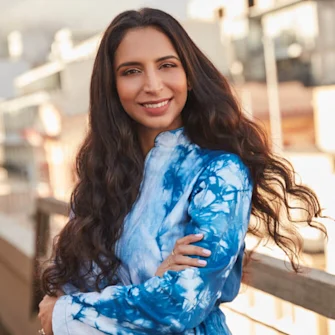
Nisha Kanabar, Founder/CEO of Industrie Africa
Building the Business
While Kanabar speaks about Industrie Africa with confidence and optimism, she doesn’t deny the obstacles it has faced and still faces today. Though it’s not yet profitable, the company is reinvesting to remain competitive. “Similar to other startups, we’re focused on growth over profit,” says Kanabar. As a self-funded startup with a small team of fewer than 10, its growth has been measured, and the team has sometimes had to turn down collaborations because they don’t have the capacity. From the get-go, they’ve had to be scrappy. “This was quite bootstrapped, between the legalities, product development, content and staff,” says Kanabar, who launched with a tight team made up of an adviser, creative lead, web designer and web developer. With a company that’s 100% remote, she’s been able to attract business and product development team members who had worked at places like Farfetch, Barneys New York and Gilt Groupe. “They had a strong understanding of luxury and retail as well as the online marketplace experience, and together, we cultivated a vision of excellence for this first-of-its-kind African venture.”
The business was also built to accommodate the unique sets of challenges these designers face. Consumers clicking around Industrie Africa will discover a unified shopping experience, but the platform actually works off a marketplace model of fulfillment, similar to how Farfetch works. Rather than shipping from a central location, once an order has been processed, the designers ship the items from the countries they’re based within. “Consider it a hybrid approach to retail,” says Kanabar. “One that melds the polish and curation of a luxury retailer with the human touch of a designer and the ability to be agile and tailor to the challenging distribution needs that a brand may have.”
VIP customer service also assists with personalizing the shopping experience and ironing out any logistical issues that may crop up along the way. “Our whole operation was tailored to be conducive to designers’ specific distribution needs. We keep quantities limited, operate seasonlessly and support formalization and standardization where it may be lacking, sharing resources, advice and solutions as needed.” Kanabar is also in constant conversation with the designers to ensure that, together, they can deliver the best possible experience. “We are always in touch to discuss and review new ideas, such as exclusives and new approaches to merchandising and pricing,” says Kanabar.
Getting items to people’s doors has also presented challenges. “The continent is historically disconnected,” she says. “Shipping within Africa can be complicated.” Though the platform has a close relationship with DHL and can now ship globally, returns can sometimes prove tricky, especially in certain countries, like Kenya. The same goes for customs and duties, which tend to be higher in some African countries. It’s hard to solve, as each country has different laws, but the site clearly outlines costs. The consumers shopping on Industrie Africa are also not your regular fast-fashion fiends. They seldom “bracket” (buy a few sizes to try on) or “wardrobe” (wear an item before returning it).
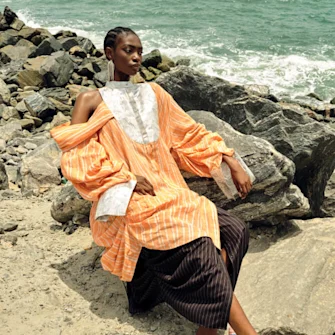
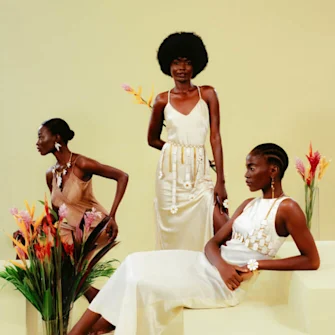
“We have a relatively high return customer rate and low return rate of products. Our customer base is unique in the fact that they don’t indulge in some of these common behaviors that can hurt other e-commerce brands,” says Kanabar. “People know that their purchases support designers and artisans.”
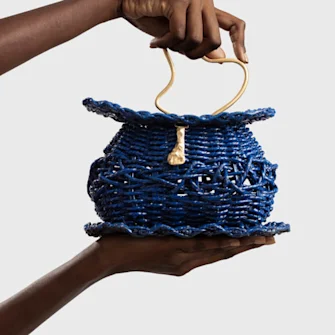
Realizing Growth Potential
Despite growing pains, the platform is gaining traction. Since 2020, the company has seen a growth in revenue of 250% year over year, and a 44% increase in the rate of returning customers. In 2022 alone, Industrie Africa grew its following by 78%. Strategic partnerships, such as a three-month campaign called Industrie Africa x Lagos Fashion Week to leverage the Lagos Fashion Week network, help boost momentum.
“Something we do well is bring the continent’s fashion scene to an international audience by sharing these best-kept secrets,” says Kanabar. “We provide 50-plus designers to anyone’s doorstep; it’s the best of Africa’s fashion to the world.” But beyond e-commerce, storytelling about the designers and their meticulous processes is a major prerogative. “Content and community are integral,” says Kanabar. “If you study the details that we’ve baked into the platform or business model, there’s been a lot of groundwork beyond having a pretty product on a pretty website.”
This is, after all, the initial thinking behind Industrie Africa — to reframe media bias and consumer misconception and spotlight designers who had gone unnoticed in the Global North. Spend some time poking around the Connect section of the site, and you’ll discover a story about each designer. Ideally, Kanabar would like to expand the Connect platform in the future, along with the e-commerce business. “As far as the natural e-commerce trajectory, I think it’s about seeking the right investors,” she says. Down the line, Kanabar would like to consider more real-world activations so consumers can experience the products they’ve seen on their screens in real life. Of course, the designers would benefit, too. Viviers says one of her brand’s main obstacles is gaining consumer trust in a new market without them having physically seen her items. “I think something that could help promote Industrie Africa is to have more physical pop-ups, so the press and people in the U.S. can experience the clothes,” says Viviers. “You have to win people over.”
To open a brick-and-mortar would “be my dream,” says Kanabar. It’s something that would likely accelerate online sales but also help new consumers truly appreciate many of the impeccably crafted pieces — to see the intricately woven threads on Afriyie-Kumi’s bags and to marvel at the delicate hand embroidery on Viviers’ dresses up close. This has ultimately been Kanabar’s aim all along. “Our mission is to challenge the stereotypes of how people perceive African fashion,” she says — one Ghanaian handbag and Kenyan necklace at a time.
